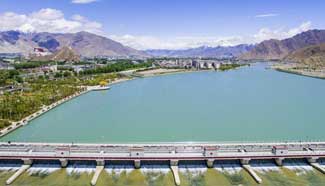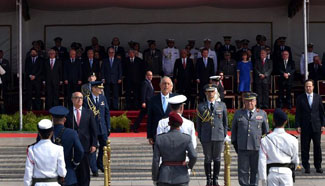
A crew member takes part in a fire drill on China's largest and most advanced patrol vessel Haixun 01 on the South China Sea, April 4, 2016. (Xinhua/Xing Guangli)
LONDON, June 10 (Xinhua) -- Regarding the South China Sea issue, Chinese Ambassador to Britain Liu Xiaoming has urged the Philippines to return to a negotiated solution and some countries from outside the region to "stop playing with fire."
Liu made the remarks in a signed article published by the Daily Telegraph on Friday.
Away from Britain's focus on the forthcoming EU referendum, the article read, "a serious international situation is developing in the South China Sea region."
There is now much discussion about whether China should accept the ruling of the South China Sea arbitration process, Liu noted in the op-ed.
Proponents of this idea claim that China's rejection would "undermine" the "rule-based international system" and would put the peace and stability of the region "under immediate threat". "We disagree," the article read.
"It is important to understand that this arbitration process was in fact started by the Philippines unilaterally as an attempt to legitimise their illegal occupation of the Nansha islands and reefs," the Chinese ambassador wrote.
He pointed out to the fact that more than 40 of China's islands and reefs in Nansha are illegally occupied by the Philippines and some other countries, who have built airstrips and deployed weapons there.
"The Philippines in particular has kept provoking disputes over islands and reefs time and again by, for example, 'grounding' a warship forcibly and illegally on China's reef to lay its claim," the article read.
China responded with maximum self-restraint, appealing for negotiations and consultations, Liu noted. "We have called for disputes to be shelved and for joint development pending the ultimate solution of the issue," he added.
"However, it now appears that the Philippines sees China's self-restraint as being weak. It has therefore gone one step further," Liu said. "It not only wants Chinese islands and reefs but has also filed for arbitration to drape its illegal occupation in the cloak of law," he explained.
Yet the tribunal has no jurisdiction over the case at all, the ambassador said, stressing that the submissions made by the Philippines appear to be related only to the classification of maritime features and fishery disputes, "but are in essence inseparable from territorial sovereignty and maritime delimitation."
Liu pointed out that territorial sovereignty is not within the scope of the UN Convention on the Law of the Sea (UNCLOS), whose preamble states that it establishes a legal order for the seas and oceans "with due regard for the sovereignty of all States".
China made a clear declaration in 2006 in accordance with UNCLOS to exclude maritime delimitation from compulsory arbitration. More than 30 other countries, including Britain, have made similar declarations.
Despite the fact that this tribunal has no jurisdiction over either territorial sovereignty or maritime delimitation, Liu continued, "the Philippines has abused its right of action by knowingly initiating an unlawful case."
The tribunal, he noted, meanwhile has abused its right of competency by knowingly accepting a case that is clearly not within its jurisdiction.
In East Asia, "the [arbitration] award will be widely regarded as the fruit of a poisonous tree, and it will fail, therefore, to garner the necessary support," the op-ed quoted Tom Zwart, a law professor at Utrecht University, as warning in a recent article.
Such a view is shared by numerous international law experts around the world, Liu wrote. "China's non-participation in the arbitration process upholds international law," he stressed.
The Law of the Sea clearly provides for a bilateral approach prior to any third-party mechanism, including arbitration, he noted, adding, "Yet it is clear that bilateral options between China and the Philippines have not been exhausted."
The ambassador pointed out that the tribunal's imprudent decision to start the compulsory arbitration process "suggests a lack of even minimal respect for the spirit and principles of the UNCLOS to say the least."
"Would anybody go into a football match where the rival team has conspired with the referee? " the article read. The answer is NO, it added, "The fans and audience would not accept it."
Liu said the "wirepuller" behind the arbitration is self-evident.
"For years this country from outside the region has been stepping up its rebalancing strategy in the Asia Pacific," the article read, "Its politicians have been making provocative remarks when talking about its Asia Pacific policies and the South China Sea issue, and its military has invested massively in the South China Sea region and areas around it."
"The arbitration is in fact its carefully drafted show; the Philippines is merely reading the script," the article noted.
"Ironically, while pointing the finger at others and labelling China as 'not abiding by international law' in the name of protecting UNCLOS and the international law, this country seems to have forgotten that it has itself refused to sign UNCLOS," it added.
"The parties directly involved in the South China Sea should consult and negotiate face to face, drawing on historical facts and international law. This is the only way we will resolve the South China Sea issue, restore harmony, and bring about lasting peace, cooperation and prosperity to this region," the article concluded.
Related:
BEIJING, June 10 (Xinhua) -- On 10 June 2016, the Chinese Society of International Law (CSIL) released a paper entitled The Tribunal's Award in the "South China Sea Arbitration" Initiated by the Philippines Is Null and Void. The executive summary of the paper is as follows:
On 22 January 2013, the Philippines unilaterally initiated arbitration with respect to certain issues in the South China Sea ( "Arbitration" ). China has maintained its solemn position that it would neither accept nor participate in the Arbitration, having stated that the tribunal constituted at the unilateral request of the Philippines ( "Arbitral Tribunal" or "Tribunal" ) manifestly has no jurisdiction. Full story
BEIJING, June 10 (Xinhua) -- The Chinese Society of International Law (CSIL) on Friday releases a paper under the title the Tribunal's Award in the "South China Sea Arbitration" Initiated by the Philippines is Null and Void, supporting the Chinese Government's position of neither accepting nor participating in the arbitration initiated by the Philippines.
From a legal point of view, the CSIL criticizes on errors the Arbitral Tribunal makes in its award on jurisdiction, and demonstrates that both this award and the pending award on merits are null and void. Full story
Spotlight: Experts say China's stance on South China Sea arbitration fully justified
BEIJING, June 10 (Xinhua) -- The Philippines' unilateral move to bring a maritime dispute with China to an international tribunal won't help resolve the problem and the right way forward is to seek settlement through bilateral talks, several foreign experts told Xinhua in recent interviews.
While expressing support for China's position of non-acceptance of and non-participation in the arbitration of the China-Philippine dispute over islands in the South China Sea, they said that Manila's arbitration act runs against the spirit of the UN Convention on the Law of the Sea (UNCLOS) and reneges on its previous promises. Full story
Interview: Manila intensifies tension in South China Sea -- former diplomat
MANILA, June 9 (Xinhua) -- The Philippine government has been behind the intensifying tensions in the South China Sea, a former diplomat of the country told Xinhua on Wednesday.
Alberto Encomienda, former secretary-general of Maritime and Ocean Affairs Center of the Philippine Foreign Affairs Department, said: "China has been for the negotiations all along, but from the beginning we are not." Full story
How to Bridge the Divide Over the South China Sea
The differences between China and the U.S. over the South China Sea issue have become a matter of concern and even anxiety. But some of the perceptions in the U.S. and elsewhere about China’s policy and intentions in the area are misplaced. A pressing task is to understand the facts and China’s intentions correctly so as to avoid real danger and consequences as a result of misinterpretation and miscalculation.Full Story
China urges Philippines to immediately cease arbitral proceedings
BEIJING, June 8 (Xinhua) -- China on Wednesday again urged the Philippines to stop its arbitral proceedings and return to the right track of settling relevant disputes in the South China Sea through bilateral negotiation with China.
Foreign Ministry spokesman Hong Lei made the comment at a routine press briefing.Full Story











